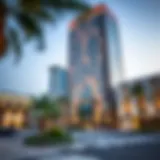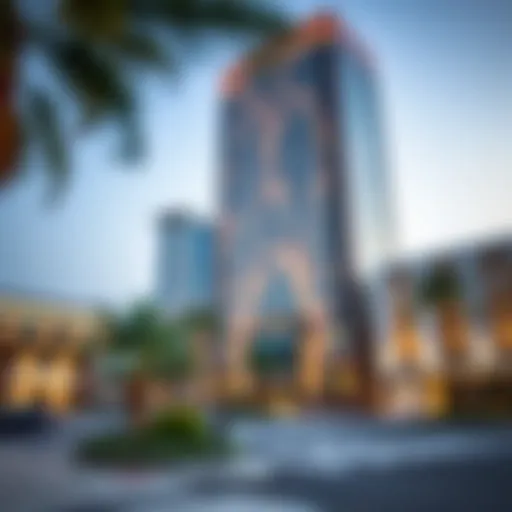Discovering the WTC Souk: Commerce and Culture in Dubai
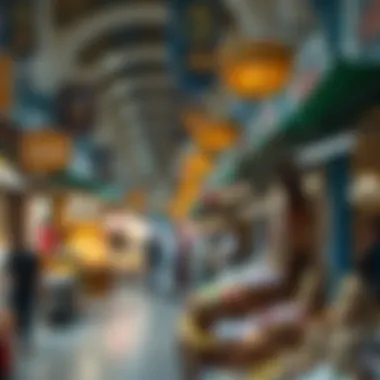

Intro
The WTC Souk stands as a remarkable epitome of Dubai’s blend of commerce and cultural vivacity. Nestled within the strategic layout of the World Trade Centre complex, this souk offers an immersive experience that is not merely a shopping hub but an amalgamation of interactions, innovative businesses, and historical narratives. Its architecture echoes the rich heritage of the UAE, drawing in both local patrons and international visitors alike.
As the landscape of Dubai continues to evolve, the WTC Souk capitalizes on its strategic position, revitalizing the old-world charm of traditional Arabian marketplaces with the contemporary glamour Dubai is known for. This article unfolds the layers of the souk, exploring its historical context, the architectural details, the variety of experiences that it offers, and its role in the broader WTC precinct. From enticing market trends waiting to be explored to potential investment avenues, there’s a lot to uncover for anyone interested in the dynamic pulse of one of Dubai's commercial epicenters.
The rest of this discourse delves deeper into market trends, investment opportunities, and significant insights for potential investors, expatriates, and property buyers.
Market Trends
Current Trends and Predictions
In recent years, the WTC Souk has seen shifts in consumer preferences and spending habits that directly impact market trends. With tourists and locals increasingly seeking unique shopping experiences, vendors in the souk have adapted to these demands. Local artisans and niche brands have taken center stage, offering everything from handmade crafts to gourmet foods. This trend of promoting authenticity has piqued the interest of tourists, who often favor experiences that resonate with local cultures.
Moreover, as the trend toward sustainability continues to gain momentum, many businesses within the souk have started incorporating eco-friendly practices. From using biodegradable packaging to promoting locally sourced products, these small changes have become significant selling points. The current direction indicates a greater emphasis on sustainable tourism, reflecting in future demand within the souk.
Analysis of Price Fluctuations
Price fluctuations within the WTC Souk are influenced by various factors, including seasonal demand and the global economy. For instance, the peak tourist season, typically aligned with major events in Dubai, such as the Dubai Shopping Festival, sees a surge in both foot traffic and prices. During off-peak periods, vendors often employ strategic discounts to retain customer interest.
To analyze these dynamics effectively, one must look at recent data trends. A report by the Dubai Chamber of Commerce suggests a 15% increase in sales during the winter months, indicating that the market is sensitive to tourism cycles. Thus, investors and consumers alike are encouraged to remain vigilant regarding these fluctuations to seize opportunities as they arise.
"Investing in understanding the cyclical nature of the market can yield considerable rewards, especially in vibrant spaces like the WTC Souk where trends can turn on a dime."
Investment Opportunities
Real Estate Hotspots
Investors looking at the WTC Souk must consider not just the commercial potential of individual stalls but also the surrounding infrastructure. The area is consistently ranked as one of the most promising real estate hotspots in Dubai, thanks to its proximity to key transport links like the Metro, major hotels, and the iconic Burj Khalifa.
Some areas within the precinct are also poised for further development. Any potential for mixed-use projects could allow for higher foot traffic, translating to increased sales for operational businesses and a healthier real estate market. Keeping an eye on new developments will help investors make informed decisions.
High-ROI Property Types
Zone-specific analysis reveals that retail spaces within the WTC Souk are particularly lucrative, especially those catering to niche markets or offering authentic experiences. Properties housing food and beverage outlets see higher returns, especially those that innovate with local culinary influences. Moreover, experiential retail spaces, which combine shopping with entertainment, also show potential for high returns on investment (ROI).
Entrepreneurs considering leasing options should also take note of pop-up retail formats, which allow for reduced startup costs and flexible rental terms, aligning perfectly with market testing trends.
As one ponders the possibilities that lie within the WTC Souk, recognizing the symbiosis between consumer behavior, market dynamics, and strategic investments is essential for capitalizing on the ever-evolving landscape of Dubai's commercial offerings.
For further information about market conditions and investment opportunities in Dubai's commercial sector, you can visit the Dubai Chamber of Commerce or Dubai Land Department.
In summary, the WTC Souk stands not just as a commercial center but as a vibrant community space that resonates with the pulse of Dubai. Investors, property buyers, and expatriates alike can find a wealth of opportunities within its walls, but understanding the nuances of market trends and investment potentials remains paramount.
Preamble to WTC Souk
Nestled in the vibrant city of Dubai, the WTC Souk stands as a remarkable confluence of business and culture, making it a pivotal destination for investors, expatriates, and visitors alike. This bustling marketplace is not just an avenue for commerce; it's a social hub that showcases the rich tapestry of local and international influences. From its intricate architectural details to the diverse range of shops and eateries, the souk encapsulates the essence of Dubai's dynamic spirit.
The importance of the WTC Souk lies in its ability to bridge traditional commerce with modern lifestyle. It provides a unique shopping experience, offering everything from high-end retail outlets to artisan crafts, catering to the diverse tastes of its visitors. Similarly, the gourmet dining options allow patrons to indulge in an array of culinary experiences, reflecting the multicultural backdrop of Dubai.
The souk also contributes significantly to the local economy, providing jobs and fostering small businesses. For investors and property buyers, understanding the WTC Souk is crucial. It represents a unique opportunity to tap into Dubai's rapidly growing market, which thrives on innovation and diversity. With its strategic location next to key landmarks, the souk stands out as a prime investment target.
In essence, the WTC Souk is not just a marketplace; it's a vibrant ecosystem that supports commerce while celebrating culture. As we dive deeper into its historical background, architectural significance, and economic contributions, we shall uncover the multifaceted value it brings to the Dubai community and beyond.
Historical Background
Understanding the historical background of the WTC Souk provides crucial insights into its commercial and cultural significance within Dubai. With roots that trace back to the early trade practices of the region, the souk serves as a vivid tapestry woven from the diverse threads of history, economy, and societal evolution. This backdrop is not just about bricks and mortar; it encapsulates stories of traders, artisans, and the relentless spirit of commerce that has thrived here over centuries.
Origins of the WTC Souk
The origins of the WTC Souk can be linked directly to Dubai's historical position as a key trading hub. The traditional souks of the past were bustling marketplaces, wherein merchants exchanged spices, textiles, and precious metals. The modern WTC Souk, established in a bid to blend this rich heritage with contemporary commercial practices, emerges from this historical context.
When the World Trade Center was envisioned in the late 20th century, it was a reflection of Dubai's aspirations to be a major player on the world stage. The souk was thus embedded within this grand narrative. Designed to emulate the lively spirit of traditional Arab souks, it incorporates local architectural styles, which is a nod to its origins. This intention reflects both a respect for the past and a foresight for the future – creating a space that resonates with both locals and tourists.
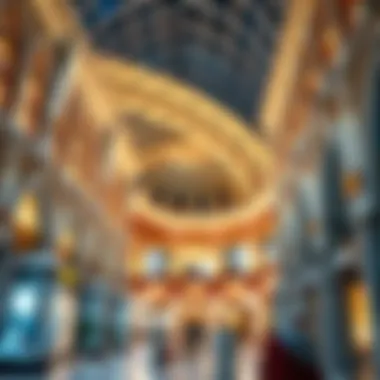

The inception of the souk marked a pivotal moment in Dubai’s evolution. It aligned with the broader economic reforms in the emirate that sought to diversify its economy from oil dependency. By fostering a marketplace for modern businesses, the WTC Souk laid the groundwork for a new era of commerce, attracting both local and international investors. This site became a meeting place, fostering cultural exchanges and supporting the city's goal as a cosmopolitan center.
Evolution Through the Years
The evolution of the WTC Souk through the years reflects the dynamic nature of Dubai’s economic landscape. As the souk matured, it adapted to the changing needs of businesses and consumers alike. Initially, the focus was on traditional goods and handicrafts, aligning with its historical roots. Yet, as Dubai grew and the demands of its residents transformed, so too did the offerings within the WTC Souk.
Today, one can find a variety of upscale retail shops, gourmet dining establishments, and unique artisan boutiques, showcasing how the WTC Souk has become a microcosm of contemporary commerce. This evolution is essential to understanding its role as a cultural reflection and a commercial powerhouse.
Moreover, seasonal events and festivals have become an integral part of the souk’s calendar, enhancing its position as a cultural hotspot. These gatherings not only celebrate the community's diversity but also attract visitors from around the globe, enriching the economic fabric of the region.
In summary, exploring the historical trajectory of the WTC Souk opens up a window into Dubai's past while hinting at its promising future. This backdrop is pivotal for investors and stakeholders seeking to understand the underlying values and trends that have shaped this iconic destination. The souk stands as a testament to resilient commerce, cultural convergence, and the vibrant spirit of Dubai.
"The WTC Souk is not merely a shopping destination; it is a living embodiment of Dubai’s rich trading heritage and vibrant future."
For more information about market trends and investment opportunities, check out resources at Wikipedia, Britannica, and local community discussions on Reddit.
Architectural Significance
The architectural significance of the WTC Souk is not merely about aesthetics; it plays a pivotal role in shaping the identity of this bustling marketplace. The design elements reflect a blend of modernity and tradition, which resonates with Dubai's evolutionary narrative. Each corner, every facade, tells a story—a story of commerce that is woven into the very fabric of the city.
The incorporation of traditional Arabic designs with contemporary architectural techniques not only enhances the visual appeal but also creates a sense of place. Investors and visitors alike are often drawn to structures that exhibit a sense of cultural continuity while embracing innovation. This fusion serves as a reminder that the past and future can coexist harmoniously.
Additionally, the layout of the souk facilitates foot traffic and encourages interaction among visitors and vendors, contributing to the overall vibrancy of the environment. In essence, the architectural craft of the WTC Souk is significant as it fosters economic activity while offering an engaging experience for all who cross its threshold.
Design Inspiration and Features
Diving deeper into the specifics, the design of the WTC Souk draws its inspiration from the essence of traditional souks found throughout the Middle East. One might notice intricate lattice work and mashrabiya screens that provide shade while allowing for breezy ventilation, reflecting a deep understanding of the local climate.
Some key features include:
- Exposed Brick Walls: These serve to connect visitors to the rich history of commerce in the region.
- Open Courtyards: These spaces are designed to encourage social gatherings, turning the souk into more than just a shopping destination.
- Stylish Lighting: The use of LED fixtures intertwined with vintage lantern replicas ties past to present, casting a warm glow in the evening.
Each element is thoughtfully placed, ensuring that the physical structure enhances not just the visual impact but also the functional capabilities of the market.
Sustainability Practices
In today's world, sustainability sits at the center of architectural advancements, and the WTC Souk is no exception. It stands as a model for incorporating eco-friendly solutions into a commercial hub. By focusing on sustainability, the designers aim to minimize the environmental impact while still providing a top-tier shopping experience.
The sustainability practices include:
- Energy-efficient Systems: These include solar panels and smart thermostats that help regulate temperature without draining resources.
- Water Conservation Strategies: Rainwater harvesting systems have been implemented for irrigation and plumbing, showcasing a commitment to smarter resource management.
- Use of Sustainable Materials: Locally-sourced materials not only reduce the carbon footprint but also support the local economy.
Emphasizing sustainability not just benefits the environment, but it can also enhance the overall appeal of the souk, making it attractive to both eco-conscious investors and consumers.
Understanding the architectural significance of the WTC Souk means acknowledging it as a living entity— one that honors its cultural roots while evolving to meet the needs of a modern market. The blend of traditional motifs with innovative design solutions portrays a microcosm of Dubai itself, an ever-growing metropolis that thrives on its rich history while looking toward the future.
Commercial Landscape
The WTC Souk stands as a microcosm of Dubai’s dynamic commercial scene. It merges tradition and modernity, drawing a diverse array of visitors and businesses alike. The relevance of understanding its commercial landscape cannot be overstated. This hub is not just a marketplace; it encapsulates the spirit of entrepreneurship while reflecting the city's economic vitality. Investors and property buyers will find that the souk represents a ripe opportunity for exploration in the context of both commerce and culture.
Types of Businesses
Retail Outlets
Retail outlets within the WTC Souk offer a captivating mix of brands, from high-end luxury to local boutiques. Their presence contributes significantly to the overall shopping experience, catering to both the affluent clientele and everyday consumers. One key characteristic of these retail spaces is their unique layout, which encourages leisurely browsing. This ambiance helps shoppers feel at ease, allowing for spontaneous purchases.
Moreover, what sets the retail outlets apart is their ability to feature exclusive collections that cannot be found elsewhere in Dubai. With such a unique advantage, these shops not only draw in tourists but also attract local regulars, establishing a loyal customer base. However, the downside can be high rental prices, which may deter potential new businesses from entering the market. Nonetheless, the exclusivity and shopping experience offered by these outlets make them a popular choice.
Gourmet Dining Options
The gourmet dining options at WTC Souk elevate it from a typical shopping experience to a culinary adventure. Featuring a variety of cuisines, these establishments celebrate flavors from around the world. This emphasis on high-quality dining not only serves the needs of shoppers but establishes the souk as a social destination. A primary characteristic of these dining spots is their focus on fresh, locally-sourced ingredients, which can attract health-conscious patrons.
The unique feature of gourmet dining here is the ability to dine al fresco, with views of the luxurious surroundings. This setting enhances the experience, making it more than just a meal; it's an event to savor. However, fine dining can sometimes come with a hefty price tag, posing a barrier for budget-conscious visitors. While this could be seen as a limitation, the variety and quality provided allow for an unmatched food exploration.
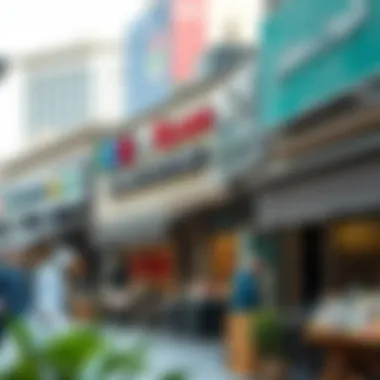

Artisan Shops
Artisan shops in the WTC Souk embody the essence of culture and creativity, showcasing local craftsmanship. They play an essential role in presenting authentic handmade products that often tell a story or represent a cultural heritage. This is particularly appealing in an era where consumers increasingly seek unique, locally-sourced items. A notable aspect of these shops is their focus on customization, enabling customers to own products tailored to their preferences.
The unique selling point of artisan shops is their connection to the artist or maker. This personal touch creates a rich narrative for each item, enhancing the value of the purchase. However, artisan shops can face challenges in competing with mass-produced items found in larger retail outlets. Believing in the value of craftsmanship allows these small businesses to thrive within the vibrant commercial landscape of the souk.
Economic Contribution
The economic contribution of the WTC Souk extends beyond mere profit margins. The commercial activity stimulates the local economy, creating job opportunities and fostering innovation. As more businesses invest in the area, the demand for services rises, leading to a ripple effect that benefits various sectors. Moreover, the souk attracts tourists and residents alike, boosting visitor spending in nearby hotels and attractions.
The WTC Souk symbolizes a vibrant merging of commerce and culture, affecting not just the immediate area but resonating throughout the greater economy of Dubai.
Ultimately, the businesses that inhabit this creative space contribute to a diverse collection that enhances the charm and allure of the souk itself while positioning it as an essential cog in Dubai’s evolving economic landscape.
Visitor Experience
When exploring the WTC Souk, the visitor experience takes center stage, shaping perceptions about not only the souk itself but also its role within Dubai. This vibrant destination offers an immersive experience, blending commerce with cultural enrichment. Highlighting various aspects, from shopping to the myriad events, enhances the understanding of what makes this souk a unique and engaging place.
Shopping and Dining Experiences
The shopping and dining experiences at the WTC Souk are like a treasure chest waiting to be discovered. The souk houses a blend of high-end retail outlets and eclectic shops, catering to diverse tastes. You’ll find everything from luxurious fashion boutiques to artisanal crafts, each telling a story of Dubai's rich culture through carefully selected goods.
Dining options range from gourmet international cuisine to local delicacies, encouraging visitors to savor and experience different flavors. Each restaurant and café has its distinct ambiance, inviting guests to indulge in culinary delights while soaking up the atmosphere around them.
Whether it's grabbing a quick bite or savoring a leisurely meal, the dining scene here is not just about food; it’s about the experience.
Shoppers can expect attentive service and a curated selection that often can’t be found elsewhere. It’s not just shopping; it’s an adventure that invites exploration.
Events and Entertainment
Within the WTC Souk, events and entertainment are woven into the fabric of the experience, offering something for everyone. The dynamic nature of the offerings serves two significant purposes: it enhances foot traffic and establishes the souk as a cultural epicenter.
Cultural Events
Cultural events are a cornerstone of the WTC Souk's identity. They highlight the rich cultural tapestry of Dubai—bringing art, music, and local traditions to life. One key characteristic of these events is their ability to foster community engagement, connecting both locals and tourists in a shared experience.
These events create a platform for artists and performers to showcase their talents, giving depth to the souk's ambiance. They might include art exhibitions, live music performances, or traditional dance demonstrations, each contributing to a narrative that celebrates the diversity of Dubai. The unique feature of these cultural events is their interactive nature, often encouraging participation from visitors. The main advantage lies in creating memorable experiences that linger long after the events conclude.
Seasonal Festivals
Seasonal festivals further amplify the vibrancy of the WTC Souk and mark the changing of the seasons with joyful celebration. These festivals reflect the culture and traditions of the region, often accompanied by colorful decorations and themed activities. They provide a unique promotion not just for the souk but for the wider community as well.
One of the key characteristics of seasonal festivals is their festive spirit, drawing large crowds and creating an electric atmosphere. The souk transforms into a haven of cultural exchange, making it a popular choice for families and individuals seeking enjoyment. Visitors experience a myriad of offerings, from crafts stations to performances, each tailored to enhance the festive mood. Nonetheless, while the festivals are vibrant and engaging, they may sometimes lead to overcrowding, requiring organizers to manage space and access carefully.
Market Trends and Investment Opportunities
Understanding the market trends and investment opportunities associated with the WTC Souk is paramount for investors and buyers alike. This part of the article serves to shed light on the shifts taking place in the retail and commercial landscape, especially in a dynamic city like Dubai. The WTC Souk, being a central hub of commerce and culture, naturally becomes a focal point in discussions surrounding revitalization, economic growth, and new ventures.
The significance of these market trends is multifaceted. As the region witnesses a surge in both local and international investments, keen observers can identify patterns that signal when to enter or exit the market. Moreover, the nuanced understanding of current trends allows stakeholders to position themselves strategically amid rising competition. By leveraging such insights, investors can make informed decisions that align with broader economic indicators.
Current Real Estate Trends
Currently, the real estate landscape in and around the WTC Souk reflects varying dynamics. Prices have seen consistent upward momentum but remain comparatively affordable due to the intensive competition. A notable characteristic of the current trend is the increasing interest in mixed-use developments. These types of projects cater not only to retail needs but also offer residential and cultural elements, enriching the overall experience for visitors and potential buyers.
- Rising Demand: With the influx of expatriates and tourists, there has been a steady demand for retail spaces, especially those offering unique authentic experiences. Local businesses thrive, contributing to an environment where entrepreneurial spirit can flourish.
- Regulatory Framework: The supportive legislation around foreign investments in Dubai allows for a favorable environment. Recent policies aim to simplify investing processes, making it much more appealing for overseas investors seeking opportunities in this vibrant city.
- Digitalization: The marketplace is gradually embracing technology—think e-commerce platforms bridging the gap between physical stores and online shopping—creating a more holistic shopping experience.
Optimistically, the WTC Souk is strategically positioned to capitalize on these trends.
Potential for Future Growth
Looking ahead, the growth potential in the WTC Souk area paints a promising picture. There’s a buzz in the air regarding upcoming developments that promise to enhance the landscape further.
"Investing in areas like the WTC Souk can offer remarkable returns, especially as it adapts to meet changing consumer behaviors and preferences."
- Sustainability Initiatives: Investors are keen on projects that focus on sustainability and eco-friendliness. Future developments at WTC Souk are likely to emphasize green building practices, appealing to environmentally conscious consumers and businesses alike.
- Cultural Integration: As an area rich in culture, there is an emphasis on promoting heritage along with innovation. New businesses that tie local tradition with modern concepts could see a boom, providing lucrative opportunities.
- Connectivity Enhancements: Future infrastructure enhancements, including transport links and road accessibility improvements, will serve to increase foot traffic, benefiting local businesses substantially. The interconnectedness will not only facilitate easier access but also encourage a more integrated approach to consumer experience.
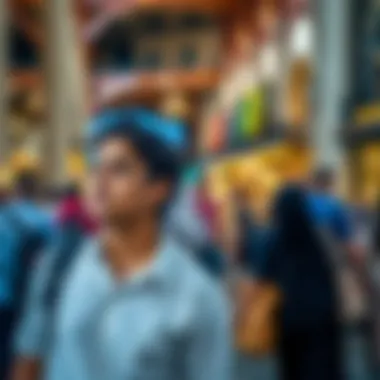

Accessibility and Location
Understanding the accessibility and location of the WTC Souk plays a crucial role in grasping its significance as a commercial and cultural hub. In a bustling city like Dubai, where time is always of the essence, the ease with which visitors can reach the souk can significantly influence their experience and overall engagement with the space. Accessibility not only opens the doors for tourists but also for potential investors, ensuring a steady flow of foot traffic that businesses crave.
Transport Links
Public Transport
Public transport in Dubai is known for its efficiency and comprehensive coverage. The souk is strategically located near several public transport options, including the Dubai Metro and various bus routes. The Dubai Metro Red Line has a stop at the World Trade Centre Station, allowing easy access to the souk, making it a popular choice among both locals and tourists.
This accessibility is enhanced by the affordable fare structure of the public transport system, offering a budget-friendly option for visitors. A unique feature of the metro system is its punctuality, often arriving every few minutes, which minimizes wait times. However, during peak hours, it can get crowded, making it a tad uncomfortable, especially for those with shopping bags in tow.
"Dubai’s metro system is a lifeline for many, joining the dots of the city seamlessly."
Road Accessibility
On the flip side, the road accessibility to the WTC Souk is equally noteworthy. With major roadways such as Sheikh Zayed Road and Maktoum Bridge nearby, traffic tends to flow relatively smoothly, providing direct access to the souk for those driving or using ride-hailing services. The souk also features ample parking options, which can be a significant draw for visitors who prefer the convenience of driving.
Local signage guides drivers clearly towards the souk, ensuring newcomers won’t get lost. Nevertheless, it's worth noting that peak traffic times can result in delays, particularly during the evening rush. Still, the ability to reach the souk easily by road contributes positively to its commercial viability.
Proximity to Major Landmarks
The proximity of the WTC Souk to significant landmarks such as the Burj Khalifa, the Dubai Mall, and various cultural attractions cannot be overstated. This closeness not only enhances the appeal of the souk but also positions it as a landmark in its own right within the vibrant landscape of Dubai. Visitors to these major attractions often flow naturally into the souk, enriching the variety of experiences available.
In addition to the obvious tourist draw, being adjacent to iconic structures can increase the visibility of the businesses within the souk. Investors looking for prime real estate opportunities will find that this location is ideal for attracting consumers looking for convenience and variety.
Future Developments
Future developments in the WTC Souk represent a significant aspect of both the area's commercial evolution and its cultural landscape. The focus on innovation and modernity positions the souk to adapt to shifting market dynamics and consumer preferences. As Dubai's real estate market continues to expand, the potential for upcoming projects within and around the WTC Souk is critical. It is not just about the physical structures, but also about creating a vibrant ecosystem that attracts both local and international stakeholders.
The benefits of these developments are manifold. First, they can attract significant investment, enhancing the economic footprint of the area. Second, new projects often mean job creation, boosting the local economy and providing opportunities for residents and expatriates alike. Additionally, with sustainability becoming a core focus in urban development, future projects are likely to incorporate green technologies and practices.
In considering the implications of these developments, stakeholders should pay attention to a few critical elements:
- Market Research: Understanding consumer trends and needs can help guide what types of businesses should be included in new ventures.
- Design Integration: Ensuring that new projects harmonize with existing architecture enhances the overall aesthetic and provides seamless navigation for visitors.
- Community Engagement: Involving local communities in planning discussions can lead to more successful outcomes, ensuring that developments meet the expectations and desires of the public.
"Urban development should reflect the culture and spirit of a community, promoting growth while preserving identity."
Upcoming Projects
The landscape of the WTC Souk is set to change with the introduction of several upcoming projects that promise to redefine the area. One of these is the anticipated expansion of retail spaces, catering to a blend of local and international brands. This will not only enrich the shopping experience but also provide a wider selection for consumers, drawing them from all over the region.
Moreover, plans for entertainment venues are in the pipeline. These spaces aim to host events that celebrate both local culture and international acts, making the souk a go-to destination for leisure and leisure activities. By investing in such projects, stakeholders can tap into the growing demand for experiential offerings in urban developments.
Impact on Surrounding Areas
The development of the WTC Souk has far-reaching implications on its surrounding areas. As the souk gets enhanced facilities, nearby neighborhoods will likely witness an uptick in interest from businesses looking to set up shop. This will contribute to the overall economic vitality of the region.
Current residents may also experience a shift in lifestyle, with improved access to shopping, dining, and entertainment options. This revitalization can foster a sense of community, drawing people together for events or casual gatherings in public spaces.
In summary, the future developments within the WTC Souk stand to weave a narrative of growth, opportunity, and cultural enrichment that will extend beyond its own boundaries.
Ending
The significance of the WTC Souk transcends its mere function as a shopping center; it symbolizes the intricate tapestry of commerce and culture that defines Dubai. In this article, we have journeyed through the souk’s rich history, architectural marvels, the diverse business spectrum it houses, and the vibrant visitor experiences it offers.
Understanding the WTC Souk is crucial for various stakeholders. For investors, it represents an opportunity to engage with a growing market that combines luxury with cultural identity, promising a lucrative return on investment. Buyers seeking property within this hub need to recognize the potential of the locale, which continuously evolves and adapts to trends, setting the standard for urban retail spaces.
Real estate agents must leverage insights gained from the souk’s commercial dynamics to provide tailored advice and market strategies to their clients. Developers looking to enter this space should consider the balance between tradition and modernity that the WTC Souk embodies, ensuring that future projects resonate with both local and international audiences.
Expatriates might find the WTC Souk an enticing melting pot of global influences, allowing for a unique blend of traditional and contemporary offerings. With various cultural events and seasonal festivities, the souk serves as a microcosm of Dubai’s diverse society, creating a sense of belonging for many.
In summary, the WTC Souk stands not just as a marketplace but as a testament to Dubai's commitment to innovation while cherishing its roots. Recognizing its multifaceted role can guide potential investors and stakeholders in making informed decisions, ultimately fostering a thriving ecosystem that reflects the essence of Dubai itself.
"The WTC Souk is more than bricks and mortar; it’s where commerce, community, and culture converge in the heart of Dubai."
For more insights into the evolving landscape of Dubai's marketplaces, you may visit Wikipedia or Britannica.
Explore the nuances of investment opportunities further on forums like Reddit or community pages on Facebook.
Understanding the soul of the WTC Souk is a step towards realizing its unique value in the vibrant ecosystem of commerce and culture in Dubai.






